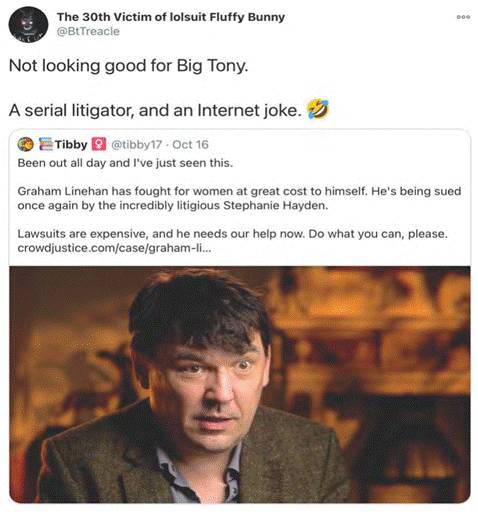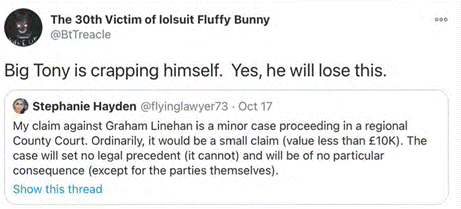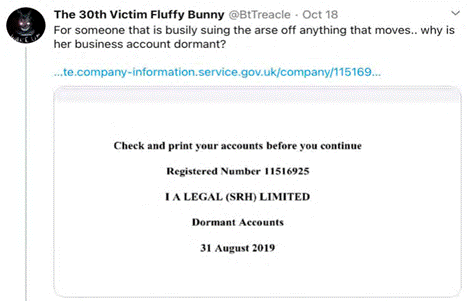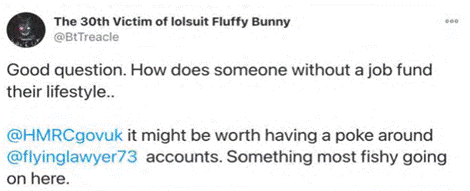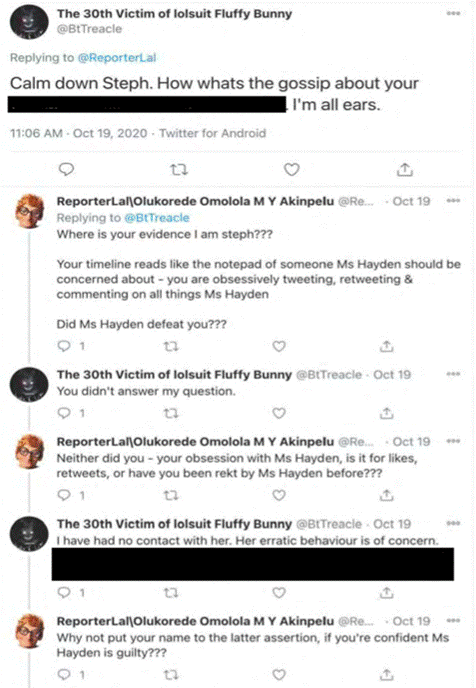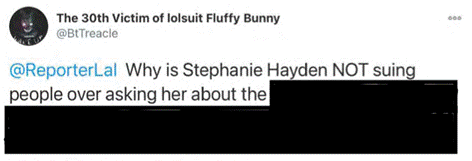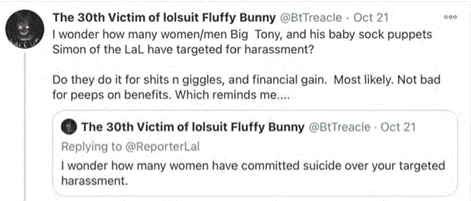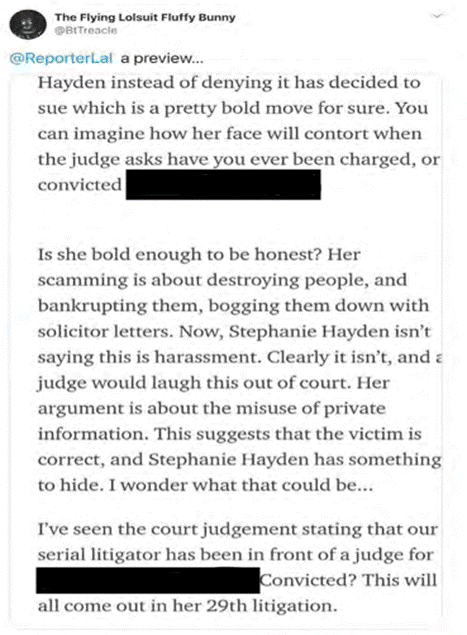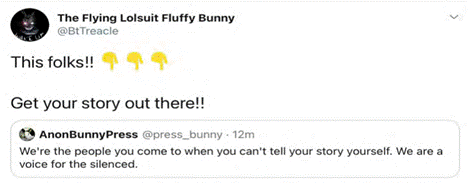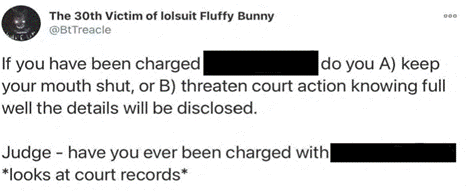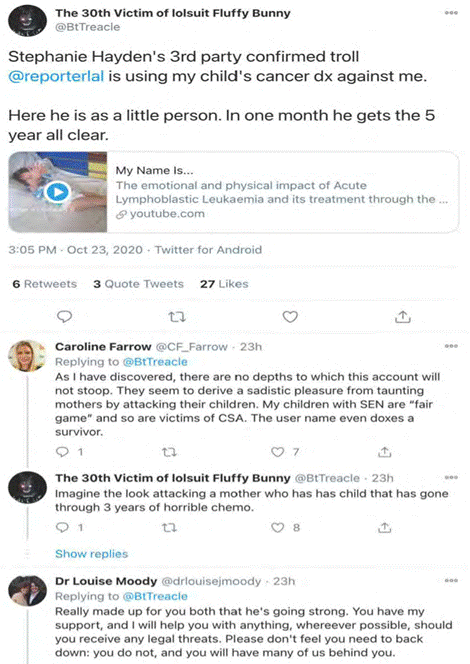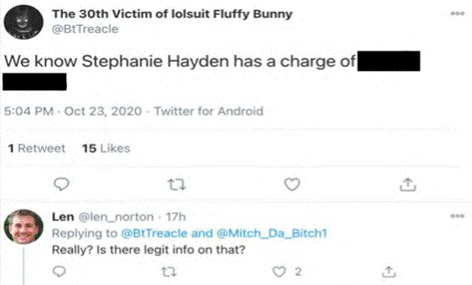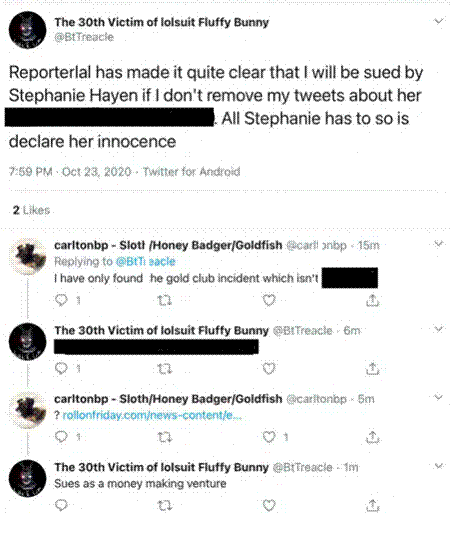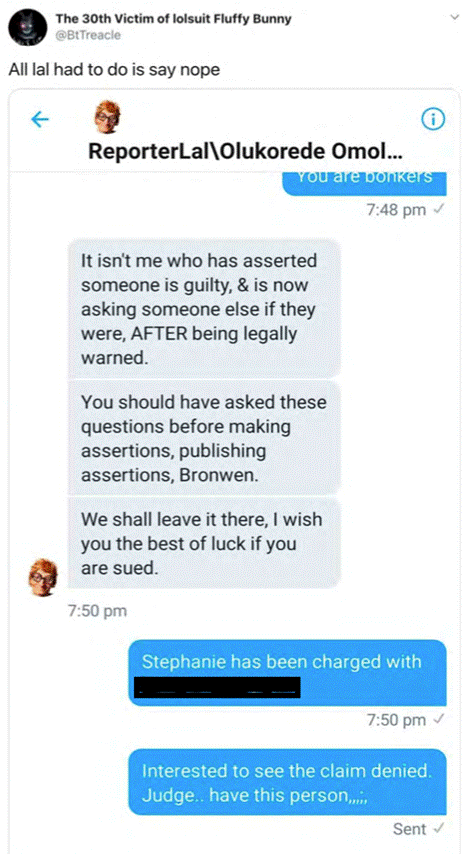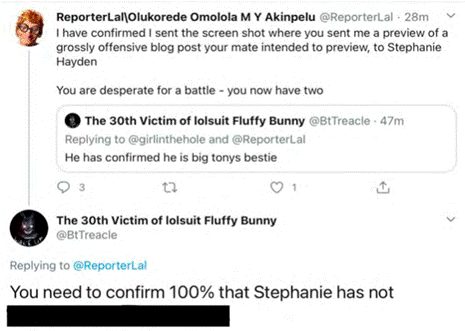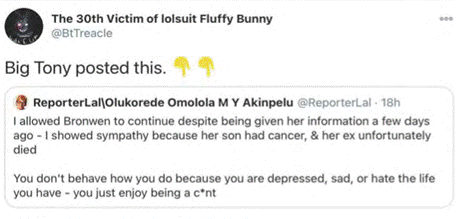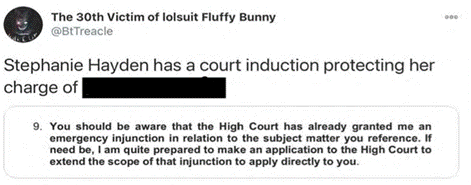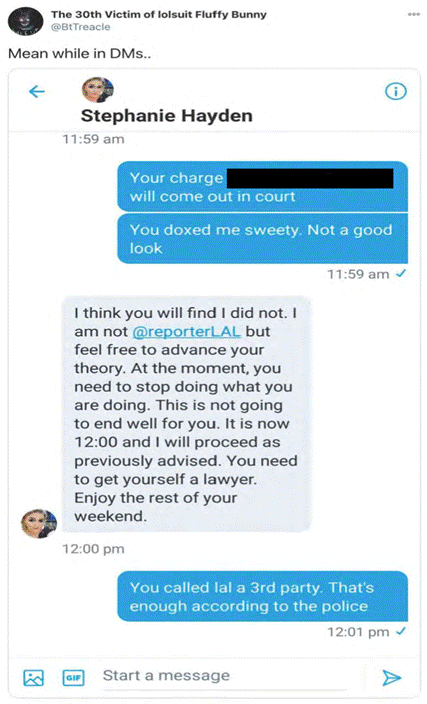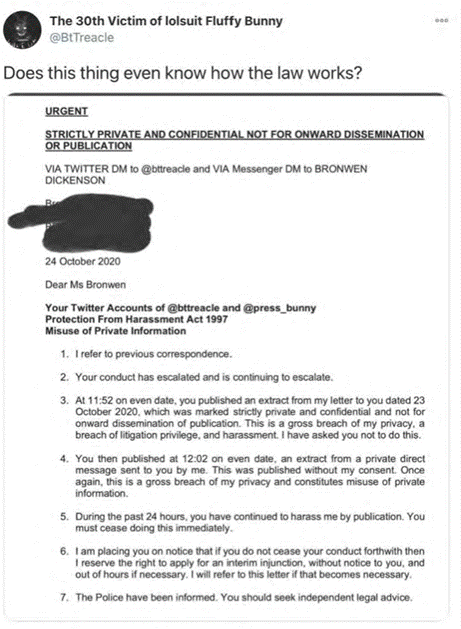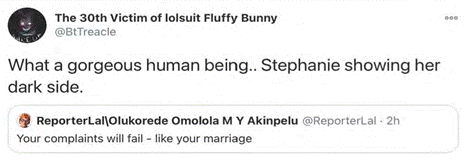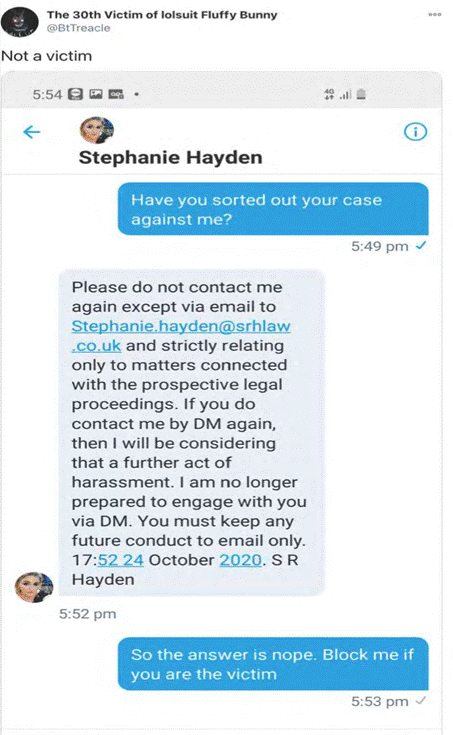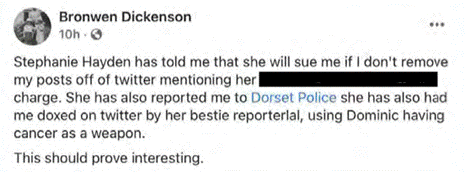Freely Available British and Irish Public Legal Information
[Home] [Databases] [World Law] [Multidatabase Search] [Help] [Feedback]
England and Wales High Court (Queen's Bench Division) Decisions
You are here: BAILII >> Databases >> England and Wales High Court (Queen's Bench Division) Decisions >> Hayden v Dickenson [2020] EWHC 3291 (QB) (02 December 2020)
URL: http://www.bailii.org/ew/cases/EWHC/QB/2020/3291.html
Cite as: [2020] EWHC 3291 (QB)
[New search] [Printable PDF version] [Help]
QUEEN'S BENCH DIVISION
MEDIA & COMMUNICATIONS LIST
Strand, London, WC2A 2LL |
||
B e f o r e :
____________________
| Stephanie Rebecca Hayden |
Claimant |
|
- and - |
||
| Bronwen Dickenson |
Defendant |
____________________
The Defendant appeared in person
Hearing date: 11 November 2020
____________________
Crown Copyright ©
- On 28 October 2020, the Claimant was granted an interim injunction against the Defendant. The injunction application was made without notice to the Defendant. The injunction was granted until a return date, which was fixed for 11 November 2020. On that date, I heard the renewed application by the Claimant for a continuation of the injunction (in modified terms). I discharged part of the injunction that was no longer sought by the Claimant and I reserved judgment on the balance of the application.
- The Claim Form was issued on 30 October 2020. It claims damages and an injunction against the Defendant for alleged harassment by publication, defamation, and misuse of private information. The Claimant alleges that these torts have been committed by the Defendant through her use of Twitter and Facebook from 17 October 2020.
- In her Application Notice, dated 25 October 2020, the Claimant sought an interim injunction to restrain alleged harassment and misuse of private information. The Claimant provided a witness statement, her first, also dated 25 October 2020. She exhibited the postings on Twitter and Facebook that she contended were harassment of her and a misuse of private information. The Claimant's Twitter username is @flyinglawyer73. The Defendant's username is @BtTreacle. At the time, the Defendant was displaying a name on Twitter: "The 30th Victim of lolsuit Fluffy Bunny". As will become clear, that name appears to have been chosen by the Defendant as a reference to the Claimant, whom the Defendant believed had issued a large number of legal claims which she considered to be vexatious.
- I have set out the messages in Appendix 1 to this judgment. For ease of reference, each message is given a number. There are other messages exhibited to the Claimant's first witness statement which I have not included (including messages from a second Twitter account which the Claimant contends was also operated by the Defendant). I have attempted to gather those upon which the Claimant has particularly relied, and others that are important for context and to understand the nature of the dispute.
- One of the Claimant's principal complaints is about the Defendant's repeated reference in her messages to a previous conviction of the Claimant. The Claimant was candid in her first witness statement about the details of this previous conviction. The Claimant is legally trained and so is familiar with her duty of full and frank disclosure on an ex parte application. She stated that the conviction – which led to the imposition of a fine – dates back over 20 years and is spent under the provisions of the Rehabilitation of Offenders Act 1974 ("the spent conviction"). Importantly, the Claimant confirmed: "I have not committed any further such offence and 22 years have passed since my conviction. The conviction is long spent… [and] there are no contemporary reports or indeed any credible reports of my previous spent conviction. I have been able to put this conviction behind me for almost 2 decades." The Claimant stated in her witness statement that the only publicly available document that records the previous conviction is a transcript of a Court of Appeal decision and that this is "only available on specialist legal databases and not accessible to the public at large without a subscription" ("the CA Transcript").
- The Claimant also, quite properly, disclosed in her first statement that she had other spent convictions also dating back some 20 years. The details of these previous convictions are not material for the present application.
- The Claimant contends that she has a reasonable expectation of privacy in respect of the spent conviction. That is an issue that will have to be resolved later in the proceedings. Until then, it would not be right, in a public judgment, to record any further details of this previous conviction. To do so, would destroy one of the things which the Claimant, in these proceedings, is seeking to protect. I have also therefore redacted parts of some of the messages that appear in Appendix 1 to remove details relating the spent conviction.
- The application was heard by Julian Knowles J during the afternoon of 28 October 2020. Although the hearing was conducted remotely, it was a public hearing. In her first witness statement, the Claimant had indicated an intention to apply for a reporting restriction in relation to her spent conviction, but the Claimant told the Judge at the hearing that she was not seeking "any general reporting restriction order". A transcript of the hearing has been obtained, which has now been provided to both parties.
- The interim injunction application was made without notice having been given to the Defendant. The Judge considered the provisions of s.12 Human Rights Act 1998 and was satisfied that there was a compelling reason why the Defendant should not be notified of the application. That reason was the Defendant had posted on Twitter and Facebook part of correspondence – marked 'private and confidential' – which had been sent to her by the Claimant.
- In her witness statement and her submissions to the Judge, the Claimant accepted that, to an extent, she had a public profile. She said this in her first witness statement:
- At the hearing, The Judge had asked her whether, as a result, this meant that she had to accept a certain degree of criticism. The Claimant responded:
- The Claimant provided the following further information in her first witness statement about other litigation she had brought, again as part of her duty of full and frank disclosure:
- Later in the hearing, the Judge asked the Claimant what effect the alleged harassment was having on her. The Claimant responded:
- In her first witness statement, the Claimant had said this about the effect of the alleged harassment on her:
- Under a heading "Balancing Exercise", the Claimant said this, in her first witness statement:
- It is apparent, from the Messages, that the Defendant came to believe that the Claimant was also operating the account @ReporterLAL on Twitter (see e.g. Messages 12, 18, 24 and 30) referring to the account as a "sock" (i.e. "sock puppet"). The account has certainly appeared very much to align itself with the Claimant and to take up battle on the Claimant's behalf. It was information provided by @ReporterLAL that apparently identified the Defendant as being the operator of the @BtTreacle account on Twitter (see [17(ii)] below). @ReporterLAL has also posted some highly provocative and seriously offensive messages directed at the Defendant and targeting, amongst other things, the Defendant's son's cancer. I have set out the messages in Appendix 2 to this judgment. Objectively judged, those messages – many sent within minutes of each other – are nasty. In my judgment, it is not surprising that these messages provoked a reaction from the Defendant. The very strong inference to be drawn from their terms is that the operator of @ReporterLAL intended them to do just that.
- There is also evidence capable of supporting the Defendant's belief that the Claimant was operating, or was connected to, the account @ReporterLAL.
- Nevertheless, the Claimant, in her first witness statement, stated clearly that she was not the operator of the account @ReporterLAL. She said this about the messages that appear in Appendix 2:
- The Claimant did not state, in those passages, that she disapproved of the messages sent by @ReporterLAL, but at the hearing before me she did say that they were unacceptable and "horrible". Perhaps importantly, although the Claimant told the Defendant that she was not @ReporterLAL, in Message 27, she did not disassociate herself from, or express and disapproval of, @ReporterLAL's messages.
- In relation to Facebook, the Claimant exhibited, by way of background, a Facebook message from the Defendant on 10 February 2019. The Defendant posted a copy of a Mail on Sunday article of that date with the headline: "Mother, 38, is arrested in front of her children and locked in a cell for seven HOURS after calling a transgender woman a man on Twitter". The Defendant commented: "There are only two genders, and women don't have a penis".
- On 24 October 2020, the Defendant posted to her Facebook account a copy of the direct messages she had exchanged with the Claimant on Twitter – Message 31 – and a copy of the first page of a further letter the Claimant had sent to the Defendant on 24 October 2020, which was marked "STRICTLY PRIVATE AND CONFIDENTIAL NOT FOR ONWARD DISSEMINATION OR PUBLICATION" – Message 28. The Defendant also posted a link to a post on Kiwi Farms, with a comment:
- The Defendant also reposted on Facebook, on 24 October 2020, the same extract from the CA Transcript that she had posted on Twitter which contained details of her previous convictions, with the comment:
- Having considered the Claimant's evidence and submissions, the Judge granted an interim injunction in the following terms:
- The interim injunction contained some of the standard provisions from the model order for interim non-disclosure orders attached to the Master of the Rolls' Practice Guidance [2012] 1 WLR 1003. The order did not, however, provide a public domain exception: see paragraph 15 of the model order and the commentary in the Guidance: "Orders will not usually, but may sometimes in cases of private information, prohibit publication of material which is already in the public domain." I will return to the issue of the potential impact of information available in the public domain on the Claimant's misuse of private information claim, below.
- Paragraph (c) of the injunction was an unusual provision. The effect was to prohibit the Defendant (and anyone with notice of the injunction order) from publishing "anything relating to these proceedings". Arguably, that would prevent the Defendant revealing even the existence of the proceedings; i.e. a "super-injunction".
- The Practice Guidance contains the following in relation to super-injunctions: [15]:
- It is clear from the transcript of the hearing that the Claimant was concerned that the Defendant might publish documents from the proceedings – particularly the Claimant's witness statement. That concern was, on the evidence, understandable, but it might have been possible to have a more targeted provision in the injunction to deal with this concern. There was also a potential conflict between the terms of paragraph (c) and the fact that the hearing had taken place in open court. In the event, the Claimant has not sought to include paragraph (c) in her application for the continuation of the interim injunction, so I do not need to say anything more about this. After the hearing on 11 November 2020, I discharged paragraph (c) of the interim injunction and reserved judgment on the balance of the application.
- The Claimant served the interim injunction on the Defendant, on 28 October 2020, by direct message on Twitter (as permitted by the injunction order), and by sending it by post. The Twitter account the Claimant used to serve the injunction order belonged to another person ("the 3rd Party Account"). In her letter of 30 October 2020 serving the injunction by post, the Claimant enclosed her first witness statement and stated:
- The injunction order did not, in fact, provide the exception that the Claimant suggested in bold, but it was sensible and pragmatic for the Claimant to suggest that she, at least, would have no objection to the Defendant obtaining legal advice. It was, perhaps, not for her to dictate the terms on which that advice could be obtained, or that the person from whom it was sought should have a practising certificate.
- The Claimant, in her second Witness Statement, dated 8 November 2020, has explained what happened following service of the injunction order.
- On 31 October 2020, an account with the username "Real Mutha For Ya" ("RMFY"), posted on the Kiwi Farms website a section from the Claimant's First Witness Statement. The extract posted contained the Claimant's reference to her previous conviction. The section appears to be a direct facsimile from the witness statement. The Claimant contends that the only person who had access to her witness statement was the Defendant and the Court. From that, she argues: "It is apparent that 'RMFY' is either the Defendant herself, or the Defendant provided access to the statement to third parties, in breach of the injunction order". The Claimant also complains that other contributors to the Kiwi Farms website have posted material that supports this conclusion and that RMFY has also posted the Claimant's address.
- It is impossible, on the evidence available to me, to reach conclusions about these issues. However, I was concerned by the Claimant's contention that RMFY was the Defendant. In earlier proceedings in July 2020, the Claimant had contended that another person was RMFY. When I asked the Claimant about this at the hearing, she submitted that it is possible that the RMFY account is operated by more than one individual. I suppose that is possible, but it demonstrates that the matter will require proper investigation. As the Claimant contends that it is a breach of the injunction order, it is a matter on which I should say no more at this stage.
- On 31 October 2020, the Claimant sent a further letter to the Defendant (by post and direct message):
- On 1 November 2020, the Claimant sent a direct message on Twitter to the Defendant using the 3rd Party Account.
- As the Claimant contends that the Defendant's responses to this message, during the evening of 1 November 2020, are further acts of harassment of her, it is necessary for me to set them out in full. (The Claimant did not respond to any of them).
- During this same evening, the Defendant also sent similar messages to the Claimant via Facebook Messenger and made 9 attempts to make a voice call – using Facebook – to the Claimant. The Claimant did not respond. The Claimant told me at the hearing that she had not blocked the Defendant's calls after the first few attempts that evening, but had done so later that evening. The text messages suggest that, in the end, the Defendant also blocked the Claimant.
- On 2 November 2020, the Claimant sent a further letter to the Defendant:
- In her second witness statement, the Claimant states that, during the morning of 2 November 2020, an "Emergency Response Police Team" from the Metropolitan Police attended at her home address to check on her welfare and to obtain an urgent statement for Dorset Police. The Claimant confirmed that she provided a statement and on the next day, she reports, the Defendant was arrested; she has subsequently been released on what the Claimant refers to as "pre-charge police bail". The Claimant added this in her second statement:
- The Defendant has confirmed that her bail conditions are (1) not to contact the Claimant directly, or indirectly; and (2) not to post on social media anything relating to the Claimant.
- s.1 Protection from Harassment Act 1997 ("PfHA") provides, so far as material:
- s.3 provides that any actual or apprehended breach of s.1(1) may be the subject of a civil claim by anyone who is or may be the victim of the course of conduct. Remedies in a civil claim include interim and final injunctions and damages for "any anxiety caused by the harassment and any financial loss resulting from the harassment": s.3(2).
- s.7(2) provides: "References to harassing a person include alarming the person or causing the person distress"; and in subsection (3) (b): "A 'course of conduct' must involve, in the case of conduct in relation to a single person (see section 1(1)), conduct on at least two occasions in relation to that person." Conduct can include speech (s.7(4)).
- A defendant has a defence if s/he shows: (i) that the course of conduct was pursued for the purpose of preventing or detecting crime; and/or (ii) that in the particular circumstances the pursuit of the course of conduct was reasonable (s.1(3)).
- The principal cases on what amounts to harassment are: Thomas -v- News Group Newspapers [2002] EMLR 4; Majrowski -v- Guy's and St Thomas's NHS Trust [2007] 1 AC 224; Ferguson -v- British Gas Trading Ltd [2009] EWCA Civ 46; Dowson -v- Chief Constable of Northumbria Police [2010] EWHC 2612 (QB); Trimingham -v- Associated Newspapers Ltd [2012] EWHC 1296 (QB); [2012] 4 All ER 717; Hayes -v- Willoughby [2013] 1 WLR 935; R -v- Smith [2013] 1 WLR 1399; Law Society -v- Kordowski [2014] EMLR 2; Merlin Entertainments LPC -v- Cave [2015] EMLR 3; Levi –v- Bates [2016] QB 91; Hourani -v- Thomson [2017] EWHC 432 (QB); Khan -v- Khan [2018] EWHC 241 (QB); Hilson -v- Crown Prosecution Service [2019] EWHC 1110 (Admin); and Sube -v- News Group Newspapers Ltd [2020] EMLR 25. From these cases, I extract the following principles
- The legal principles for claims of misuse of private information and now well-established and have recently been restated by the Court of Appeal in ZXC -v- Bloomberg LP [2020] 3 WLR 838 [38]-[49] per Simon LJ.
- The law recognises that, in an action for misuse of private information, unlike breach of confidence, the fact that information sought to be protected may be accessible in the public domain is not necessarily determinative of whether a person can have a reasonable expectation of privacy in the information. The question is not whether the information was generally accessible, but rather whether an injunction would serve a useful purpose; whether the point has been reached where there is no longer anything left to be protected: Green Corns Ltd -v- Claverley Group Ltd [2005] EMLR 31 [78]-[79] per Tugendhat J and McKennitt -v- Ash [2006] EMLR 10 [81] per Eady J. In CTB -v- News Group Newspapers Ltd [2011] EWHC 1326 [23], Eady J explained the underlying right the Court was being asked to protect:
- Whether, and to what extent, a person can have a reasonable expectation of privacy in respect of a previous conviction which has become spent under the Rehabilitation of Offenders Act 1974 was considered by Warby J in NT1 -v- Google Inc [2019] QB 344. The case involved so called right-to-be-forgotten, or more accurately the right of a data subject to have personal information "de-listed" by the operators of internet search engines. The Judge set out the legal framework relevant to the claim in [13]. Included at [13(3)] was the following in relation to rehabilitation of spent convictions:
- Detailed consideration of the provisions of the 1974 Act was contained in [15]-[21]. Of potential relevance to the issues I have to resolve is the way in which Parliament has legislated for the treatment of spent convictions in the law of defamation. The Judge said this:
- The Judge's conclusions on this issue, which given their importance to the issues in this case I should set out in full, were as follows [166]:
- In harassment cases that do not involve speech (e.g. classic stalking behaviour), the test at the interim injunction stage is the familiar American Cyanamid Co Ltd -v- Ethicon Ltd [1975] AC 396. However, the grant of interim injunctions in cases that engage a defendant's right of freedom of expression are subject to s.12(3) Human Rights Act 1998, which provides:
- "Likely" in this context generally means "more likely than not": Cream Holdings Ltd -v- Banerjee [2005] 1 AC 253. Warby J summarised the position for the Court at the interim stage in YXB -v- TNO [2015] EWHC 826 (QB) [9]:
- Interim injunctions to restrain defamatory publications are subject to a higher threshold than s.12(3): Bonnard -v- Perryman [1891] 2 Ch 269; Greene -v- Associated Newspapers Ltd [2005] QB 972 (see discussion in Khan -v- Khan [69]-[72]). At the interim stage, the court will not grant an injunction to prevent publication of defamatory words if the defendant says that s/he will defend the publication as protected by any of the defences in ss.2-4 Defamation Act 2013 (truth, honest opinion, publication on a matter of public interest). A claimant cannot avoid this rule by framing his claim in alternative causes of action. The Court will scrutinise the claim being made by a claimant to determine whether the 'nub' of the claim is the protection of reputation and therefore subject to the stricter rules.
- Finally, the terms in which a harassment injunction is granted, whether interim or final, must be drafted carefully. The recent case of Glenn -v- Kline [2020] EWHC 3182 (QB) provides this guidance:
- The hearing of the Claimant's renewed application for an interim injunction took place remotely on the return date, 11 November 2020. The hearing took place, as it had done before Julian Knowles J, in public. Several members of the public joined the remote hearing. The Defendant did attend the hearing, although, as I explain further below ([94] and [104]), I learned shortly before the hearing that she did not have access to the hearing bundle. I decided to continue with the hearing, rather than to adjourn, because it was primarily for the Claimant to satisfy me that she should be granted a continuation of the injunction and it was also clear that she was not seeking the continuation of material parts of the order of 28 October 2020, principally Paragraph (c) (see [14] above). I invited the Defendant to make any submissions that she wished to in response to the Claimant's submissions, but her ability to make detailed submission was limited by the non-availability of the hearing bundle.
- The Claimant provided to the Court a draft of the revised injunction order that she invited the Court to make. The material parts of the draft provided as follows:
- The draft order also:
- The Claimant made clear at the hearing of her application that she was seeking the interim injunction on the grounds of alleged harassment and misuse of private information. Although she has included a claim for defamation in her Claim Form, she has not sought an interim injunction to restrain further alleged defamatory publications. The Claimant recognises the significantly higher threshold that would apply to an application for an interim injunction to restrain defamatory publications: see [52] above. The Claimant did not pursue the application for deletion of particular posts and none was identified.
- There is an overlap between the causes of action for harassment and misuse of private information in respect of the Claimant's complaint about the publication of her spent conviction and the publication of correspondence sent by the Claimant to the Defendant which was marked private and confidential. The Claimant argues that, particularly, public reference to her spent conviction is both a misuse of private information and that its repeated publication by the Defendant also amounts to harassment.
- At the hearing, the Claimant took me through the posts of the Defendant on Twitter and Facebook and the other communications from the Defendant which she said amounted to harassment. The information is not available in the evidence before the Court, but the Claimant told me that @BtTreacle had some 1,200 followers on Twitter. As I have noted already, the Claimant was not one of them.
- She told me that, in relation to this matter, she had been alerted to the Defendant's Tweets about her as a result of Message 7 (see Appendix 1) which had 'tagged her' by using her Twitter name (@flyinglawyer73). The Claimant submitted that tagging her in this way was a 'knock at her door' because the effect was that the relevant message appeared in her notifications on Twitter. As a result of seeing that the Defendant was posting Tweets about her, she then looked at what else the Defendant had posted. From that, she identified Messages 1-6, particularly Message 5 which referred to the Claimant's spent conviction.
- The Claimant stated that she felt harassed by Message 7. I asked whether, at this point she had blocked the Defendant's account on Twitter. Doing so would have meant that the Claimant would have received no further notifications were the Defendant to 'tag' her in a Tweet and any messages from the Defendant's Twitter account would not have been shown in the Claimant's timeline. That latter point, on the facts of this case, is somewhat academic as the Claimant told me that she was not a follower of the Defendant's account on Twitter at the time, so messages from the Defendant (unless re-Tweeted by one of the accounts the Claimant did follow) would not have appeared in the Claimant's timeline or by way of notification. That is not to say that the Claimant (or others) could not see the Defendant's Tweets; they remained publicly available on the platform. It just meant that, to read them, the Claimant would have to manually search through the Defendant's Tweets.
- At the hearing, the Claimant told me that she did not immediately block the Defendant after Message 7. She blocked the Defendant's account at some stage, after Message 16, later on 23 October 2020, the day on which she had sent her letter of complaint to the Defendant. The Claimant confirmed that, apart from Message 7, the Defendant had not tagged her in any subsequent Tweets. The Claimant was aware of these later messages because she had sought them out on Twitter. After she had blocked the Defendant, searching for her Tweets entailed the Claimant logging out of her account on Twitter and accessing the Defendant's Tweets via the publicly accessible platform. In some cases, the alleged harassment can be drawn to the subject's attention by third parties. The Claimant told Julian Knowles J, at the hearing on 28 October 2020, that this was not the situation in relation to the Tweets of the Defendant about which she objected. She had found them herself. The Claimant also confirmed, at the hearing before me, that the Defendant's messages had not led to any "pile on" (the phenomenon of a social media messages provoking many others to respond, often in an aggressive or disapproving manner).
- In relation to Facebook, the Claimant accepted that she was not a Facebook friend of the Defendant and had therefore had to seek out the messages that had been posted about her. She said that the article and comment posted by the Defendant on 10 February 2019 (see [20] above) proves that the Defendant has demonstrated transphobic hostility towards her. The other postings on Facebook (see [22]-[23] above), the Claimant submits, are harassment of her and the publication of the extract from the 24 October 2020 letter and the information disclosed in relation to the previous conviction are also a misuse of her private information.
- As to the arrest of the Defendant, and her subsequent release on what the Claimant refers to as "pre-charge conditional bail", the Claimant acknowledged that the Defendant's bail conditions prevented her from engaging in any further alleged harassment of the Claimant or contacting her. She submitted, nevertheless that a civil injunction was still required, principally on the basis that any sanction for breach of police bail is not the equivalent of the sanctions available for breach of an injunction.
- The Defendant made some limited submissions in response. She pointed out that it was she who had asked the Claimant to block her on Twitter (see Message 31). She denied being the person who had posted – or provided the material for the post – on Kiwi Farms on 31 October 2020 (see [31] above). The Defendant stated that the material could have been obtained by anyone who had the Dropbox link sent by the Claimant to the hearing bundle. Overall, the Defendant stated that she had posted on Twitter about the Claimant because she was frustrated about the way that the Claimant had behaved towards other people.
- In reply, the Claimant stated that she had not sent the Dropbox link to the hearing bundle to anyone else.
- The terms of the interim injunction that the Claimant seeks are set out in [55] above.
- I can deal with Paragraph (b) quite shortly. In my judgment, the Claimant has not demonstrated that she is likely to be granted a restriction in these terms at trial. Put simply, the terms are far too broad; it would represent a disproportionate interference with the Defendant's Article 10 rights. An injunction in this form would prevent the Defendant from even mentioning, online, that she was being sued in these proceedings by the Claimant. It would silence the Defendant from commenting on the Claimant or her activities. I can scarcely conceive of circumstances in which the Court would grant an injunction in these terms. Injunctions to prevent harassment have to identify, precisely, the harassing conduct that the Court is prohibiting. Merely mentioning someone in an online post, without more, is very unlikely to amount to harassment. Insofar as the Claimant seeks to justify an injunction in these terms based on alleged misuse of private information, it fails. Injunctions to prevent misuse of private information identify the private information that cannot be published. Paragraph (b) does not identify any information that is to be subject to a restriction; it simply prohibits any mention of the Claimant. That is not private information.
- The Claimant contends that an injunction in the terms of Paragraph (a) is justified both on the grounds of harassment and misuse of private information. Paragraph (c) is said to be justified on the basis of harassment.
- As to the historic acts of alleged harassment relied upon to support the injunction application, I am not satisfied that the Claimant has demonstrated that the acts of the Defendant relied upon have crossed the line between unattractive or unreasonable behaviour to conduct that is oppressive and unacceptable. The acts of the Defendant took place in a fairly limited time frame. Apart from one message, none of the Tweets or Facebook messages about which the Claimant complains was objectively "targeted" at the Claimant. The hallmark of harassment is a persistent and deliberate course of targeted oppression. If the Claimant had not sought out the Defendant's Tweets in which she was not tagged or the Facebook messages, she would have been entirely unaware of them.
- Whilst I accept that some of the language of the Defendant's posts has been unpleasant, and may have upset the Claimant, most of it either falls comfortably within the width of freedom of expression or is puerile 'name-calling'. It is plain from the Defendant's posts that she was critical of the Claimant as someone she considered to be a bully (Message 29), a "serial" and "vexatious" litigator (Messages 1, 5, 14, 17) – even renaming her account "The 30th Victim of lolsuit" – and someone she wished to see defeated (Message 11). The Defendant raised questions (by posting similar issues raised by others) about how the Claimant could afford to fund her lifestyle and substantial litigation (Messages 5 and 7), which was not an unreasonable question for a layperson to ask.
- As I have already noted above (see [15]-[19] above), from Message 9 onwards, the Defendant's posts must be seen in the context of the substantial provocation of @ReporterLal whom, it is clear, the Defendant considered was (or could well be) an account operated by, or connected to, the Claimant. The connection (if any) between the Claimant and @ReporterLal may become an issue to be explored in the proceedings. If the Claimant knew that she was not responsible for the provocative and abusive posts sent by @ReporterLal to the Defendant, then she would have appreciated immediately that at least some of the ire in the Defendant's posts was directed at (and caused by) @ReporterLal. It is difficult to see how the Claimant could reasonably have regarded that as harassment of her.
- The Court can reasonably expect a person who is the subject of unwanted communications to engage in a degree of self-help before seeking to obtain a harassment injunction from the Court. The first step is self-resilience: the ability to ignore or shrug off unpleasant messages or comments, a quality that is perhaps all the more important if a person intends to engage in public debate. The Claimant herself has acknowledged this and accepted that "when you put yourself in the public eye you expect a certain extent… of criticism and you have to be robust and you have to have thick skin" (see [11] above). Even outside the arena of debate, most people, during their lives, will encounter occasional online comments that are critical and unpleasant, even offensive and upsetting. Sometimes that offence is intended, on other occasions the capacity for the remarks to hurt and upset is not fully appreciated by the critic. But everyone is expected to show a degree of tolerance and resilience in the face of this sort of occasional unpleasantness. These are part of the day-to-day irritations, annoyances and upset that are a fact of modern life (see [44(ii)] above).
- If communications are specifically directed towards, or targeted at, the subject (e.g. being sent direct emails or messages or being tagged in an online post) then step two is to take advantage of such practical options that are available to prevent the unwanted contact. Most modern communications platforms now provide readily accessible functionality to block such contact. Of course, someone who is intent on contacting a person can take steps to overcome measures taken to block him/her (e.g. by changing the method of communication or using different telephone numbers or accounts). But the use of such anti-blocking activity is likely to strengthen a complainant's allegation that s/he is being harassed and needs additional protection.
- In this case, the Claimant blocked the Defendant's account on Twitter on 23 October 2020 after Message 16 (see [62]). The Defendant did not, in fact, tag the Claimant in any subsequent messages. The only reason the Claimant was aware of them was because she sought them out, even going to the lengths of logging out of her account on Twitter and using the public platform to access the Defendant's Tweets.
- Put simply, if the alleged harassment can be stopped by the simple expedient of recourse to available blocking tools, it is neither necessary nor proportionate for the Court to grant an injunction; it is disproportionate in the sense that there is readily available a less intrusive measure than an injunction that would achieve the same aim.
- This principle has particular application in relation to paragraph (c) of the proposed injunction. On the facts of this case, I am not satisfied that the burst of attempted contact of the Claimant by the Defendant by telephone (or VoIP equivalent) and text messages during the evening of 1 November 2020 (see [35] above) amounts to harassment of the Claimant. She did not accept any of the calls. It was tolerably clear from the text messages, sent at around the same time, that the Defendant wanted to talk to the Claimant about the litigation. It was, of course, the Claimant's right not to engage with the Defendant, but it does not follow that the attempts at contact were harassment. In any event, the Claimant had at her disposal the option of simply blocking further calls from the Defendant; an option which she indeed exercised later that evening. On this basis alone, an injunction cannot be justified as necessary. There is no evidence that the Defendant has attempted to make further telephone contact with the Claimant since she was blocked on 1 November 2020. Since 3 November 2020, she has been subject to bail conditions prohibiting her from doing so (see [39] above).
- Although the Claimant has complained that the publication of extracts from letters she had sent to the Defendant in the course of the legal proceedings was a misuse of private information (and harassment), the interim injunction that she seeks would not impose any restriction on further publication of correspondence in this category. Paragraph (a) of the proposed injunction is targeted solely at preventing publication of information relating to any spent convictions of the Claimant.
- The real issue is whether the Court should grant an interim injunction now to restrain the Defendant from further publishing any information about the spent conviction. It is clear from the evidence that the Claimant has other previous convictions, that are also spent, but the attention has (perhaps naturally) been centred on the particular previous conviction which was the subject of several posts by the Defendant (Messages 3, 8-10, 13-14, 16, 20-23, 25-27 and 32). Certainly, that has been the focus of the Claimant's submissions.
- This issue is much more finely balanced, whether looked at on the basis of harassment or misuse of private information. On the basis of the evidence of the Claimant about the offence, the date of original conviction, the sentence imposed and the limited extent to which information about the conviction is presently available in the public domain, and applying the general rule (see NT1 [166(2)]), the Claimant's Article 8 rights are engaged in relation to further publication of information about the spent conviction.
- Those Article 8 rights, and the threatened interference with them, fall to be assessed against any competing rights, principally freedom of expression. But, where the claim relies upon or depends to a significant extent upon harm to reputation, the Court is bound to have regard to s.8 of the 1974 Act: NT1 [166(3)].
- I have referred above ([52)] to the very limited circumstances in which the Court will grant an interim injunction to restrain allegedly defamatory publications. Where the allegedly defamatory publication sought to be restrained by interim injunction is of a spent conviction, the effect of s.8 Rehabilitation of Offenders Act 1974 and s.13 Civil Evidence Act 1968 (as described in NT1 [21]) is that a claimant would, for all practical purposes, have to advance an unanswerable case of malice before the Court would be prepared to grant an injunction. The formidable nature of that hurdle means that, where the claimant seeks the injunction on the ground of alleged misuse of private information and/or harassment, the scrutiny of whether the nub of the Claimant's claim is the protection becomes even more important. Against that, there are now well-established principles that, in a claim for harassment and/or misuse of private information, neither the truth of the information nor its availability in the public domain is determinative against the claim: [44(x) and (xi)] and [44] above.
- In parts of her submissions and witness evidence (see §50 quoted in [15] above) the Claimant has, in places, appeared to advance her claim on the basis of protection of reputation. Nevertheless, I am satisfied that the nub of the Claimant's application for an injunction is not the protection of reputation. I consider that she is seeking, legitimately, to prevent the intrusion into her private life represented by repeated public references to the spent conviction.
- To assess the engaged rights, the Court must apply an intense focus when carrying out the ultimate balance of the competing rights under Re S (see [44(viii)]). The extent of the interference of the Claimant's Article 8 rights by repeated reference to her spent conviction, I accept, is potentially significant. It undermines her ability to draw a line under offences that are decades old and in respect of which she is statutorily rehabilitated. The potential significance is mitigated, somewhat, by two factors. First, the actual and threatened extent of publication. The Defendant had some 1,200 followers. The Court is not dealing with publication on the scale of a national newspaper. Secondly, a careful analysis of the Messages demonstrates that, at least initially, the Defendant was questioning whether the Claimant had the spent conviction, rather than stating as a fact that she did.
- Against that, it is necessary to analyse carefully the interference with the Article 10 rights of the Defendant if an injunction in the terms of Paragraph (a) is granted.
- As I have said, I have found this finely balanced. On the issue of the intense focus on the competing rights, I would narrowly have come down in favour of the Claimant and found that she was likely, at trial, to establish that making publicly available details of her spent conviction should not be allowed. A significant factor in my conclusion on the ultimate balance is the fact that the Defendant has not (yet) advanced any particular justification for seeking to make public details of the spent conviction. That conclusion would not have justified an order in the wide terms of Paragraph (a), but a suitable form of wording could have been found.
- I have, nevertheless, decided to refuse to grant an injunction at this stage, as an exercise of discretion, because I am not satisfied that any interim injunction is necessary. As a result of the Claimant reporting the alleged harassment of the Defendant to the police, the Defendant has been arrested. She has not (as yet) been charged with any offence, but she has been released on bail. The conditions of the Defendant's bail prohibit her from carrying out the acts that were sought to be restrained by the modified injunction (see [39] above). Although the Claimant has argued that the sanction for a breach of police bail is not a sufficient deterrent to prevent further actions by the Defendant, I consider this to be speculative. It is not alleged that the Defendant has breached the bail condition not to contact the Claimant; a restriction that was not imposed by the original injunction order. If, following the discharge of the existing injunction, the Defendant breaches the terms of her police bail and further publishes details of the Claimant's spent conviction on social media or other public platform, then the Claimant may be justified in returning to Court with such evidence demonstrating that an injunction is necessary. Time will tell.
- There are also several factors which undermine the Claimant's contention that, absent her bail conditions, the Defendant actually threatens further to publish details of the spent conviction.
- In my judgment, the Claimant is not entitled to an injunction in the terms of Paragraphs (b) and (c) and the Court should refuse an injunction in anything like the terms of Paragraph (a) because such an order is not necessary at this stage. In consequence, the ex parte order granted by Julian Knowles J will not be extended and the Claimant's application is dismissed.
- I should, perhaps, add a few further observations. This is the second case in which I have considered objections by the Claimant to what has posted about her online. Although I have decided, at this interim stage, that the Claimant is not entitled to an injunction against this Defendant on the basis of the evidence as it stands at the moment, it is clear that some people have set out to harass the Claimant online. Some of the abuse directed at the Claimant, particularly on the Kiwi Farms website, authored by people emboldened by, and complacent in, their anonymity, clearly represents a persistent and deliberate course of targeted oppression significantly aggravated by the fact that it is carried out as a group activity.
- Finally, I should record that after the hearing, I received several further emails, including emails sent by someone claiming to be RMFY. Any emails received were forwarded to the parties. I have not taken them into account.
- On 12 November 2020, the day after the hearing was completed, the Claimant sent an email to my clerk in the following terms:
- The issues raised by the Claimant require me to set out a few further details about the hearing on 11 November 2020.
- The email from the Defendant to which the Claimant refers was received by the central Queen's Bench Listing email address at 09.27. The message was eventually forward to me just before 10am. In it, the Defendant stated:
- I am, of course, familiar with the provisions of CPR 39.8 and, at 09.58, I sent an email to my clerk asking him to reply to the Defendant (copying in the Claimant) to ask whether she could be reached by telephone.
- My clerk duly sent an email reply to the Defendant (and copied to the Claimant) at 10.07. Unfortunately, the email did not include (as I had intended) the Defendant's original email to the Court. At 10.22, the Claimant sent an email to my clerk asking to be provided with a copy of the email that the Defendant had sent to the Court. At 10.24, my clerk asked me whether he should provide a copy of the Defendant's email. I responded, at 10.26, confirming that he should.
- At 10.30, the time the hearing was due to commence, my clerk sent a further email to me after receiving an email from the Defendant, at 10.28, in which the Defendant had asked – in response to the Claimant's email of 10.22 requesting a copy of the Defendant's email to the Court – "Could I kindly request that my email to Judge not be shared with Ms Hayden. My personal circumstances are private…" In view of that concern, I instructed my clerk to hold off sending a copy of the Defendant's original email, until I had had a chance to consider whether the email should be provided in redacted form. The hearing then commenced, and I referred to the fact that the Defendant did not have access to the electronic hearing bundle. The Claimant did not raise the issue of the email sent by the Defendant. A copy of the Defendant's email was sent to the Claimant together with a further email the Defendant had sent to the Court after the hearing in which she accepted that emails she sent to the Court would have to be provided to the Claimant. The parties were reminded of the provisions of CPR 39.8 and the need to copy each other into communications with the Court.
- As to my requirement that the Claimant should file a witness statement identifying other litigation that she had commenced, I made clear at the hearing that was not for the purposes of the present application, but with a view to facilitating future case management of the claims, particularly those that had overlapping issues. The only point that has arisen in the course of the current application that raised an issue about earlier litigation was the Claimant's contention as to the person(s) responsible for the RMFY account (see [32]). In the Claimant's claim against Adrian Yalland – referenced by the Claimant in point 7 of her email – I had recalled that, at the hearing on 30 July 2020, the Claimant had alleged that Mr Yalland was responsible for the RMFY account. I asked the Claimant about this apparent change of position at the hearing.
- A response was sent to the Claimant's email of 12 November 2020 the next day:
- The Claimant did not provide any further submissions, but she did include some further paragraphs in the witness statement that she provided giving details of the other legal claims she had commenced. The statement repeated most of the points that had been made in the email of 12 November 2020 but also objected that the hearing had been "effectively a rehearing of the ex parte application with the learned judge substituting his own views for those of Julian Knowles J" and she had been "forced to present [her] case blind to the Defendant's own case".
- In Bubbles & Wine Ltd -v- Lusha [2018] EWCA Civ 468, Leggatt LJ summarised the applicable principles:
- The Claimant's complaint appears to fall into two broad categories: (1) the failure to disclose to the Claimant the Defendant's email (sent to the Court at 09.27) was unfair and I had been influenced by its tone and content to permit the Defendant a 'free pass' at the hearing; and (2) the conduct of the hearing on 11 November 2020 was unfair to her and would lead a fair-minded and informed observer to conclude that I was biased against the Claimant.
- I do not consider that the fair-minded and informed observer would conclude that reading the Defendant's email would have biased me against the Claimant. The email does contain some personal information about the Defendant, but it was not of a character that it could give rise to any credible suggestion that it would cause me to be biased against the Claimant. The matters raised in the Defendant's email had no bearing on the legal or factual merits of the issue I had to decide. Judges are well used to having to put out of their minds matters that are not relevant to issues to be determined.
- The email did raise one issue that did have a bearing on the conduct of the hearing: the Defendant did not have access to the hearing bundle. There was no suggestion that the Claimant had failed to serve the documentation; it was simply that the Defendant could not access what had been sent to because her mobile phone had been seized and physical copies of the documents had been sent by the Defendant to be scanned. I decided that the hearing could nevertheless go ahead, fairly – at least initially – because the burden was upon the Claimant to establish her case for an interim injunction. If she could not do so, there would be no need to hear from the Defendant. The hearing before Julian Knowles J had been ex parte without notice to the Defendant. The interim injunction had been granted as a temporary measure until the inter partes hearing. At the hearing on 11 November 2020, it was for the Claimant to persuade the Court that she should be granted an injunction, whether in the revised terms that she sought or at all. To that extent, the Claimant is right that the hearing was effectively a rehearing of the application before Julian Knowles J. But there is nothing unusual or unfair about that, as a fair-minded and informed observed would immediately appreciate.
- The Defendant had filed no evidence, so there was no question of the Claimant being forced to present her case "blind"; the Defendant had advanced no case (whether to suggest that she had a defence to the alleged harassment under s.1(3) PfHA or any form of public interest defence in respect of the claim for misuse of private information).
- I considered that it was important to proceed with the hearing – rather than simply to adjourn – because Paragraph (c) of the original interim injunction was problematic – for the reasons I have explained (see [25]-[27] above) – and, by the hearing, had already given rise to allegations that its terms had been broken by the Defendant and others. The Claimant also accepted that this part of the injunction should be discharged. The Claimant was aware that the Defendant did not have access to the hearing bundle. She did not ask for the hearing to be adjourned. I considered that, in the circumstances, I could fairly proceed with the hearing.
- As to the conduct of the hearing – separate from the suggestion that the hearing should not have been adjourned – a fair-minded and objective observer would understand that the Court's duty, when two presented by two litigants in person is to adopt such procedure at any hearing as it considers appropriate to further the overriding objective: CPR 3.1A(4). That will usually entail guiding parties as to issues that they will need to address. The Claimant, in fact, and as she recognises, is legally trained. She was therefore more likely to understand the Court's task and the legal framework that the Court needed to consider. Practically, and legally, the burden of persuading the Court to grant the injunction lay on the Claimant. Asking her questions to test the merits of her submissions, for example questions whether she had blocked the Defendant, would not suggest to a fair-minded and objective observer any bias. On the contrary, they were designed to and did provide opportunities for the Claimant to address points of potential importance to the issues that had to be resolved. As made clear in Bubbles & Wine [17] bias means prejudice against one party unconnected with the legal or factual merits of the case. To the extent that any of my questions to the Claimant might have suggested scepticism that the matters about which the Claimant complained passed the legal threshold for harassment, they went to the heart of the legal and factual merits of the case. I gave the Claimant a full opportunity to explain why she contended that the messages about which she complained amounted to harassment.
- In my judgment, the Claimant has not demonstrated the fair-minded and informed observer would conclude that there was a real possibility that I was biased against the Claimant. The recusal application is simply an effort to remove me as the Judge in the case because, following the hearing, she had believed that there was a risk that I would reach a determination that was adverse to her, not as a result of any bias, but as a result of the proper examination of the factual and legal merits of her claim.
- I therefore dismiss the application that I should recuse myself from further involvement in this case.
- In response to a Tweet by the Defendant from 8 February 2013 referring to fund-raising efforts for her son, at 10.43 @ReporterLAL reply Tweeted:
- In response to a Tweet by the Defendant from 14 December 2012 saying that her son was alive thanks to blood donors, at 10.44 @ReporterLAL reply Tweeted:
- In response to a Tweet by the Defendant from 9 February 2013 stating that she had been asked whether cancer was infectious, at 10.45 @ReporterLAL reply Tweeted:
- At 10.46, @ReporterLAL Tweeted:
- At 10.48, @ReporterLAL Tweeted a link to the Defendant's fundraising page for her son and added:
- At 10.52, @ReporterLAL Tweeted the following message – demonstrating that she had been researching publicly available information about the Defendant:
- At 10.52, @ReporterLAL Tweeted a similar message:
- At 10.59, @ReporterLAL Tweeted:
- At 11.29, @ReporterLAL Tweeted:
The Honourable Mr Justice Nicklin :
The Claim
The Interim Injunction
"I am a minor public figure known for my involvement with the ongoing debate surrounding transgender issues. I have been harassed for 2 years. One woman has been convicted of a criminal offence for targeting me online. This court has issued 2 interim injunctions restraining 2 women from harassing me. I have a number of ongoing claims proceeding in this court for harassment… It is accepted that I am, to some extent, a public figure. I am a well known and controversial contributor on the ongoing debate on transgender issues…"
"Absolutely… when you put yourself in the public eye you expect a certain extent, a degree, of criticism and you have to be robust and you have to have thick skin. However… there comes a point where the line gets crossed. Just because one engages in a debate does not mean that one has to sit there whilst someone screams effectively in your face, albeit in a digital platform, that [redacted reference to the spent conviction] from 25 years ago or you've killed someone or responsible for someone's death… Nobody, whether it's the prime minister to the most junior public figure in the land should be expected to put up with that…"
"The Defendant is also likely to argue that I have a record of litigation. She may seek to argue that I am a vexatious litigant (I am not) and make a living from suing those with whom I disagree (I do not). The Court is invited to note that I was granted an ex parte injunction on 22 October 2020. The Defendant may argue that I am seeking to use the Courts to silence my critics or prevent disclosure of my previous offending conduct, which the Defendant might argue should be disclosed as being in the public interest. I would disagree."
"To be blunt..., apart from it being a complete and utter pain in the backside, it's distressing. Because I am involved in this debate, I have to develop a thick skin and accept, you know, a level of criticism. But in the last two weeks with this defendant, and of course what happened last week, to have this constantly thrown in your face about something that happened a quarter of a century ago… I just think there's a real issue now that if this is allowed to get a head of steam…"
"[The Tweets] have caused (and continue to cause) me significant distress. The Defendant repeatedly references [the spent conviction]. I am accused of targeting women for harassment as well as operating the Twitter account @ReporterLAL... There is a noticeable escalation in content and frequency after I send my first warning letter on 23 October 2020… Some of the Defendant's tweets are transphobic..."
"49. The Defendant's conduct has caused my family and me significant alarm and distress… To be publicly referenced as [having the spent conviction]… is alarming, distressing and constitutes a total disregard for my privacy and my legal right to be considered a rehabilitated person.
50. I am required to travel abroad as part of my professional duties. If the Defendant is allowed to continue tweeting about me in this way then I risk being unable to do so.
51. There is no legitimate public interest in the Defendant continuing to tweet about me in this matter. I have never tweeted about the Defendant, I do not know her, I have never met her. My conviction dates back decades and there has been no repeat of the offending conduct. I am entitled to be treated as a person of good character."
i) Message 8 in Appendix 2 (sent on 23 October 2020) and Message 25 in Appendix 1 (the day after) appear to show that the account is privy to information about the Claimant's intended legal action against the Defendant.
ii) In her letter of claim, dated 23 October 2020, the Claimant told the Defendant that she had been able to identify her as the person behind the @BtTreacle account on Twitter:
"… by cross-reference to unique media information on your personal Facebook account. This unique information includes your residential address information and history, posts on Twitter and Facebook, as well as information relating to your family and your organisation of a fundraiser to raise funds in respect of your cancer diagnosis within the family. I have also been able to identify you as a former member of the British National Party"
In her first witness statement, the Claimant stated that she had received the information that the Defendant was the operator of the @BtTreacle account on 22 October 2020 and that it had been "provided to [her] by an anonymous Twitter account operating via the username @ReporterLal."
iii) It may also be of significance that, in Message 8 Appendix 2, @ReporterLAL accused the Defendant of racism, a charge that has also been made by the Claimant. In her letter of claim, sent at 10.41 on 23 October 2020, the Claimant stated:
"Should legal proceedings become necessary, I will be left with no option other than to involve your own family, by reference to your social media posts on Twitter and Facebook, in order to positively identify you as the operator of @bttreacle… It will also be necessary to evidence your previous membership of the British National Party…"
In her first witness statement, the Claimant also repeated her claim that the Defendant was a former member of the British National Party. The significance, or relevance, of this information has not be explained by the Claimant. She did not mention it at the hearings before Julian Knowles J or me.
"[These messages] appear to coincide with the time I sent my initial warning letter to the Defendant (which was 10:41 on the same date). The tweets speak for themselves. I have not posted those tweets. I had no involvement with those tweets and I did not instruct any other person to compose those tweets. I had no involvement at all with this series of tweets. I understand the Defendant takes the view that I posted the tweets or that I was somehow involved. I was not.
I do not operate the @ReporterLAL account. I do not have access to the @ReporterLAL account. I do not know the in real life identity of the operator of the @ReporterLAL account. I do follow the account and the account follows me. I do exchange direct messages with the account. I exchange direct messages with many of my followers on Twitter."
"According to an article written on a legal blog in 2018, [the Claimant]'s autism can be traced back all the way to 1999, when he refused to move his vehicle from another man's parking space [redacted]"
The reference to the "legal blog" was to the Roll on Friday website, to which the Defendant had also posted a link on Twitter on 18 and 23 October 2020 – Messages 4 and 21. It is not necessary to go into the details of this incident.
"Stephanie Hayden has told me that she will sue me if I don't remove my posts off twitter mentioning her [previous conviction]. She has also reported me to Dorset Police she has also had me doxed on twitter by her bestie reporterlal, using [son's name] having cancer as a weapon.
This should prove interesting."
"Doxing" is the practice of searching for and publishing on the internet private or identifying information about a person, often done with a malicious intent.
"Until the return date of 11 November 2020 at 10.30 or further Order of the Court, the Defendant must not:
(a) publish in any form whatsoever (online or offline) anything directly or indirectly stating, implying or inferring that the Claimant has been convicted of a criminal offence, which can be considered as spent pursuant to the provisions of the Rehabilitation of Offenders Act 1974;
(b) directly or indirectly reference the Claimant on any form of social media, online forum, or website including (but not limited to) Twitter, Facebook, Kiwi Farms, Medium, WhatsApp, Telegram, Signal and Messenger;
(c) publish in any form whatsoever anything relating to these proceedings."
"It will only be in the rarest cases that an interim non-disclosure order containing a prohibition on reporting the fact of proceedings (a super- injunction) will be justified on grounds of strict necessity, i.e., anti-tipping-off situations, where short-term secrecy is required to ensure the applicant can notify the respondent that the order is made: T -v- D [2010] EWHC 2335 (QB). It is then only in truly exceptional circumstances that such an order should be granted for a longer period: Terry -v- Persons Unknown [2010] EMLR 400 [41]."
Events after the grant of the interim injunction
"The Exhibits are available in the full Electronic Bundle, which is available to you to access at the following URL: [a Dropbox link was provided].
The Electronic Bundle has already been provided to you via Twitter Direct Message and Facebook Messenger in any event. You are reminded about the terms of the injunction regarding publication of anything relating to the proceedings. This does not stop you obtaining independent legal advice from a properly retained legal representative holding a practising certificate…" (bold in the original)
"I refer to the Interim Injunction Order of Julian Knowles J dated 28 October 2020.
You are in breach of the Order.
I refer you to the following URL [link to Kiwi Farms website]
… Real Mutha For Ya exhibits an extract from my First Witness Statement (paragraphs 33 and 34), which you are restrained from publishing by reason of paragraph 2 of the interim injunction order. You (or someone acting on your behalf) has published details of a spent conviction, published a reference to me on Kiwi Farms, and published material relating to the instant proceedings. All of which are expressly restrained by the injunction order.
I now require you to provide me with details of each and every person you have passed a copy of my First Witness Statement too (sic) (or permitted any person to read), including full name and residential address, and the date. If you have provided this material to anyone who is not a properly retained legal representative (holding a practising certificate) then I demand your explanation as to why you had done this.
You need to understand that you are in very serious difficulty. Quite frankly, you risk going to prison. I have already made Dorset Police aware of this development. You realise that I will be raising this with the High Court on 11 November 2020 and I suggest you better have a very good explanation indeed.
I require your response by 4pm on Friday 6 November 2020, in default of which I reserve the right to make an application for your committal to prison without any further warning to you…
You may send me any correspondence or documents relating to these proceedings by email to [address given]." (emphasis in original)
"This is Stephanie Hayden; however, this account does not belong to me. It was used to serve you the injunction with the full knowledge and authority of the account holder. I have noted that an extract from my Witness Statement has appeared on Kiwi Farms yesterday (31 October 2020), which breaches… the injunction. The statement for you was written in a very specific way and only the court, you, and me, legally have copies of that statement. As such, the leak to Kiwi Farms is traceable to you. It is a breach of the injunction to publish anything about the court case or reference me directly or indirectly online. Your tweet to ReporterLAL references these proceedings and are (sic) a further breach of the injunction. You need to obtain professional legal advice very quickly. A High Court injunction is a serious matter. You are in this mess because of your attitude last week. You are making things far worse for yourself (including your message to me). I have told you to contact me via email. This is the last time I will engage with you. Get yourself a solicitor."
17.26 I have the money. Hope this is worth fighting
17.32 I have also not gone bonkers
17.34 If you want the world to know about your criminal record, just go for it.
20.18 Now I have the money, I will also ask the court to reveal lal. He is clearly your mouth piece.
20.23 I am surrounded by people with lots of money.
20.26 We both know this won't go to court, and you will try to settle. I'm up for a full court case. We need to end your vexatious litigation. Your move.
20.30 Speak
20.32 OK stay silent. Let's do this the legal way
20.37 Show yourself. Want to talk on the phone.
20.40 You have a chance to help yourself. Call me.
20.42 Posting this knowing you will have this spammed for (sic) and wide – [mobile telephone number given]. Call me.
20.43 Call me
20.44 No?
20.49 Call me. I will be changing my number.
20.57 Call me. Call me. We can sort this out on the phone… of (sic) drag this out in court. Call me
20.59 Call me. I am about to go to bed.
21.06 Call me
21.08 You don't have the balls to call me.
21.12 Let's talk this out, I'm not a monster. Call me.
21.13 Can confirm of (sic) you give lal my number
21.19 Call me
21.24 Okie dokie. I am going crash Stephanie. I have given you a chance to speak to me. I'm not looking forward to your trolls abusing my phone number. Call me.
22.57 Call me
23.07 I'm going to block you stephanie. I have extended a hand of friendship. See you on the 11th Xx.
"On the evening of 1 November 2020, you sent me repeated direct messages via Twitter Direct Message to the [3rd Party Account], and via Facebook Messenger to my private Facebook account. I have previously asked you to contact me via email only and I repeated this request on 1 November 2020…
Direct Messages
From approximately 17.10 until 22.57, you sent me repeated direct messages across multiple platforms demanding that I telephone you. Some of the messages were threatening and sinister in nature, including one stating that you did not want to destroy me. You made reference to my 'criminal record'. The direct messages in terms of their manner, frequency, and content were unreasonable, they were unwanted (and that should have been apparent to you), they were oppressive, and constitute harassment.
Audio and Video Calls
You attempted to call me via video and audio call to my Facebook Messenger account at the following times:
21:29, 21:34, 22:35, 21:36, 21:37, 21:40, 21:44; 21:47, and 21:53
At least 2 of the above were attempted video calls. You have therefore attempted to make direct audio or video contact with me 9 times within a period of 24 minutes. Some of these attempts were made whilst I was on the telephone to Dorset Police. This is completely unacceptable and you must not, under any circumstances whatsoever, make any attempt to contact me by audio or video call again. Your conduct constitutes harassment; it is abusive, intimidating, unreasonable, oppressive and frightening. It must have been obvious to you that your attempts at direct contact were unwanted. Yet you continued and frightened both my flat mate and me…"
"As the Defendant is now subject to pre-charge conditional bail, it has been difficult to contact the Defendant in order to serve this statement and the updated electronic bundle on her. This statement is being sent to the Defendant in the first class post on 9 November 2020; however, it will be necessary to establish an authorised method of communication in the context of these proceedings."
Harassment: the Law
"(1) A person must not pursue a course of conduct - (a) which amounts to harassment of another, and (b) which he knows or ought to know amounts to harassment of the other.
(1A) [omitted]
(2) For the purposes of this section …, the person whose course of conduct is in question ought to know that it amounts to … harassment of another if a reasonable person in possession of the same information would think the course of conduct amounted to harassment of the other.
(3) Subsection (1) does not apply to a course of conduct if the person who pursued it shows -
(a) that it was pursued for the purpose of preventing or detecting crime,
(b) that it was pursued under any enactment or rule of law or to comply with any condition or requirement imposed by any person under any enactment, or
(c) that in the particular circumstances the pursuit of the course of conduct was reasonable."
i) Harassment is an ordinary English word with a well understood meaning: it is a persistent and deliberate course of unacceptable and oppressive conduct, targeted at another person, which is calculated to and does cause that person alarm, fear or distress; "a persistent and deliberate course of targeted oppression": Hayes -v- Willoughby [1], [12] per Lord Sumption.
ii) The behaviour said to amount to harassment must reach a level of seriousness passing beyond irritations, annoyances, even a measure of upset, that arise occasionally in everybody's day-to-day dealings with other people. The conduct must cross the boundary between that which is unattractive, even unreasonable, and conduct which is oppressive and unacceptable. To cross the border from the regrettable to the objectionable, the gravity of the misconduct must be of an order which would sustain criminal liability under s.2: Majrowski [30] per Lord Nicholls; Dowson [142] per Simon J; Hourani [139]-[140] per Warby J; see also Conn -v- Sunderland City Council [2007] EWCA Civ 1492 [12] per Gage LJ. A course of conduct must be grave before the offence or tort of harassment is proved: Ferguson -v- British Gas Trading Ltd [17] per Jacob LJ.
iii) The provision, in s.7(2) PfHA, that "references to harassing a person include alarming the person or causing the person distress" is not a definition of the tort and it is not exhaustive. It is merely guidance as to one element of it: Hourani [138] per Warby J. It does not follow that any course of conduct which causes alarm or distress therefore amounts to harassment; that would be illogical and produce perverse results: R -v- Smith [24] per Toulson LJ.
iv) s.1(2) provides that the person whose course of conduct is in question ought to know that it involves harassment of another if a reasonable person in possession of the same information would think the course of conduct involved harassment. The test is wholly objective: Dowson [142]; Trimingham [267] per Tugendhat J; Sube [65(3)], [85], [87(3)]. "The Court's assessment of the harmful tendency of the statements complained of must always be objective, and not swayed by the subjective feelings of the claimant": Sube [68(2)].
v) Those who are "targeted" by the alleged harassment can include others "who are foreseeably, and directly, harmed by the course of targeted conduct of which complaint is made, to the extent that they can properly be described as victims of it": Levi –v- Bates [34] per Briggs LJ.
vi) Where the complaint is of harassment by publication, the claim will usually engage Article 10 of the Convention and, as a result, the Court's duties under ss.2, 3, 6 and 12 of the Human Rights Act 1998. The PfHA must be interpreted and applied compatibly with the right to freedom of expression. It would be a serious interference with this right if those wishing to express their own views could be silenced by, or threatened with, proceedings for harassment based on subjective claims by individuals that they felt offended or insulted: Trimingham [267]; Hourani [141].
vii) In most cases of alleged harassment by speech there is a fundamental tension. s.7(2) PfHA provides that harassment includes "alarming the person or causing the person distress". However, Article 10 expressly protects speech that offends, shocks and disturbs. "Freedom only to speak inoffensively is not worth having": Redmond-Bate -v- DPP [2000] HRLR 249 [20] per Sedley LJ.
viii) Consequently, where Article 10 is engaged, the Court's assessment of whether the conduct crosses the boundary from the unattractive, even unreasonable, to oppressive and unacceptable must pay due regard to the importance of freedom of expression and the need for any restrictions upon the right to be necessary, proportionate and established convincingly. Cases of alleged harassment may also engage the complainant's Article 8 rights. If that is so, the Court will have to assess the interference with those rights and the justification for it and proportionality: Hourani [142]-[146]. The resolution of any conflict between engaged rights under Article 8 and Article 10 is achieved through the "ultimate balancing test" identified in In re S [2005] 1 AC 593 [17] per Lord Nicholls.
ix) The context and manner in which the information is published are all-important: Hilson -v- CPS [31] per Simon LJ; Conn [12]. The harassing element of oppression is likely to come more from the manner in which the words are published than their content: Khan -v- Khan [69].
x) The fact that the information is in the public domain does not mean that a person loses the right not to be harassed by the use of that information. There is no principle of law that publishing publicly available information about somebody is incapable of amount to harassment: Hilson -v- CPS [31] per Simon LJ.
xi) Neither is it determinative that the published information is, or is alleged to be, true: Merlin Entertainments [40]-[41] per Elisabeth Laing J. "No individual is entitled to impose on any other person an unlimited punishment by public humiliation such as the Defendant has done, and claims the right to do": Kordowski [133] per Tugendhat J. That is not to say that truth or falsity of the information is irrelevant: Kordowski [164]; Khan -v- Khan [68]-[69]. The truth of the words complained of is likely to be a significant factor in the overall assessment (including any defence advanced under s.1(3)), particularly when considering any application interim injunction (see further [50]-[53] below). On the other hand, where the allegations are shown to be false, the public interest in preventing publication or imposing remedies after the event will be stronger: ZAM -v- CFM [2013] EWHC 662 (QB) [102] per Tugendhat J. The fundamental question is whether the conduct has additional elements of oppression, persistence or unpleasantness which are distinct from the content of the statements; if so, the truth of the statements is not necessarily an answer to a claim in harassment.
xii) Finally, where the alleged harassment is by publication of journalistic material, nothing short of a conscious or negligent abuse of media freedom will justify a finding of harassment. Such cases will be rare and exceptional: Thomas -v- News Group Newspapers [34]-[35], [50] per Lord Phillips MR; Sube [68(5)-(6)].
Misuse of private information: the Law
"It is important always to remember that the modern law of privacy is not concerned solely with information or 'secrets', it is also concerned importantly with intrusion. That is one reason why it can be important to distinguish between the way the law approaches public domain arguments in relation to commercial or state secrets, for example, and that which is appropriate to personal information. It also largely explains why it is the case that the truth or falsity of the allegations in question can often be irrelevant: see e.g. McKennitt -v- Ash [2008] QB 73 [80] and [87]."
These statements of principle were approved by the Supreme Court in PJS -v- News Group Newspapers Ltd [2016] AC 1081 [32], but with the reminder that each case has to be considered on its own facts.
"The Rehabilitation of Offenders Act 1974, which provides by sections 1, 4 and 5 that some convictions become 'spent' after the end of a specified rehabilitation period. Whether a conviction becomes spent and if so when depends on the length of the sentence. The 1974 Act contains provisions specifying the legal effects of a conviction becoming spent. Those effects are subject to certain specified exceptions and limitations."
[19] Google attaches importance to another of the express limitations on the statutory right to rehabilitation. Section 8 is headed "Defamation actions". Section 8(1) provides that the section applies to:
"any action for libel or slander begun after the commencement of this Act by a rehabilitated person and founded upon the publication of any matter imputing that the plaintiff has committed or been charged with or prosecuted for or convicted of or sentenced for an offence which was the subject of a spent conviction."
[20] The section, in its current form (as amended by s.16 Defamation Act 2013), goes on to say:
"(3) Subject to subsections (5) and (6) below, nothing in section 4(1) above shall prevent the defendant in an action to which this section applies from relying on any defence of justification or fair comment or under section 2 or 3 of the Defamation Act 2013 which is available to him or any defence of absolute or qualified privilege which is available to him, or restrict the matters he may establish in support of any such defence.
(4) Without prejudice to the generality of subsection (3) above, where in any such action malice is alleged against a defendant who is relying on a defence of qualified privilege, nothing in section 4(1) above shall restrict the matters he may establish in rebuttal of the allegation.
(5) A defendant in any such action shall not by virtue of subsection (3) above be entitled to rely upon a defence under section 2 of the Defamation Act 2013 if the publication is proved to have been made with malice."
[21] In summary, a defendant who is sued for defamation in respect of a publication imputing the commission by the claimant of a criminal offence which is the subject of a spent conviction can rely on any reporting privilege that may exist and/or on a defence of truth or honest opinion, unless the publication is proved to have been made with malice. In defamation, a conviction is conclusive proof of guilt, against a claimant: s.13 Civil Evidence Act 1968. So in any such claim the real issue will be malice, which appears to mean an irrelevant, spiteful, or improper motive: Herbage -v- Pressdram Ltd [1984] 1 WLR 1160. These are not defamation claims, but Google invites me to regard this aspect of the 1974 Act as also embodying an important legal policy to which I should give effect in rejecting the claimants' claims."
"(1) The right to rehabilitation is an aspect of the law of personal privacy. The rights and interests protected include the right to reputation, and the right to respect for family life and private life, including unhindered social interaction with others. Upholding the right also tends to support a public or societal interest in the rehabilitation of offenders. But the right is not unqualified. It will inevitably come into conflict with other rights, most notably the rights of others to freedom of information and freedom of expression. It is not just legitimate but clearly helpful for Parliament to lay down rules which clearly prescribe the point at which a given conviction is to be treated as spent. But such rules, depending simply on the offender's age and the nature and length of the sentence, can only afford a blunt instrument. Parliament has legislated for exceptions, but these cannot be treated as necessarily exhaustive of the circumstances in which information about a spent conviction may be disclosed. More subtle tools are needed, if the court is to comply with its duty under the [Human Rights Act] to interpret and apply the law compatibly with the Convention. Section 4 of the 1974 Act must be read down accordingly as expressing a legal policy or principle.
(2) The starting point, in respect of information disclosed in legal proceedings held in public, is that a person will not enjoy a reasonable expectation of privacy: Khuja -v- Times Newspapers Ltd [2019] AC 161 ... But there may come a time when they do. As a general rule (or "rule of thumb", to adopt the language of the Working Party), the point in time at which Parliament has determined that a conviction should become spent may be regarded as the point when the convict's article 8 rights are engaged by any use or disclosure of information about the crime, conviction, or sentence: see R (T) -v- Chief Constable of Greater Manchester [2015] AC 49… But this does not mean that in 1974 Parliament enacted a right to confidentiality or privacy from that point on: R (Pearson) -v- Driver and Vehicle Licensing Agency [2003] RTR 20 and L -v- Law Society [2008] EWCA Civ 811... Still less does it follow that the convict's article 8 rights are of preponderant weight, when placed in the balance. As a matter of principle, the fact that the conviction is spent will normally be a weighty factor against the further use or disclosure of information about those matters, in ways other than those specifically envisaged by Parliament. The starting point, after all, is the general policy or principle in favour of that information being "forgotten", as expressed in section 4 of the 1974 Act. That policy has if anything become weightier over time. It is likely that in many cases the particular circumstances of the individual offender will support the application of that general principle to his or her case. But the specific rights asserted by the individual concerned will still need to be evaluated, and weighed against any competing free speech or freedom of information considerations, or other relevant factors, that may arise in the particular case.
(3) Part of this balancing exercise will involve an assessment of the nature and extent of any actual or prospective harm. If the use or disclosure causes, or is likely to cause, serious or substantial interference with private or family life that will tend to add weight to the case for applying the general rule. But where the claim relies or depends to a significant extent upon harm to reputation, the court is in my judgment bound to have regard to section 8 of the 1974 Act. It is possible to identify a public policy that underlies that section, and which qualifies the public policy that underpins section 4. It is that offenders whose convictions are spent should not be able to obtain remedies for injury to their reputation (or consequent injury to feelings) resulting from the publication in good faith of accurate information about the spent conviction, or the related offending, prosecution or sentence. It is not a satisfactory answer to this point to say that the causes of action relied on are not libel or slander, but data protection and/or misuse of private information. That is too narrow and technical an approach, which ignores the fact that neither cause of action was known to Parliament when it legislated. The fact that, as I accept, reputational harm can support a claim under those causes of action tends, in fact, to undermine the force of that argument. I therefore do not accept that the policy that underlies section 8 falls to be disregarded merely because the claim is not framed in defamation. Again, there can be no bright line, because Convention jurisprudence shows that reputational harm can be of such a kind or severity as to engage article 8 (Yeo -v- Times Newspapers Ltd [2017] EMLR 1 …); but subject to considerations of that kind I would consider that this statutory policy or principle falls to be applied by the court.
(4) Another aspect of the proportionality assessment will be the nature and quality of the societal benefits to be gained in the individual case by the use or disclosure in question. Freedom of expression has an inherent value, but it also has instrumental benefits which may be weak or strong according to the facts of the case. The fact that the information is, by its very nature, old will play a part at this stage also.
(5) Most, if not all, of these points about spent convictions are likely to be relevant in more than one context. Where a spent conviction is the subject of a de-listing claim, the court will need to weave its evaluation according to domestic principles into the overall … balancing exercise [from Google Spain SL -v- Agencia Española de Protección de Datos [2014] QB 1022]. The Working Party criteria are a key tool for this purpose. One matter that [Counsel for the Information Commissioner] rightly identifies as needing due weight at this stage is fact that de-indexation does not per se remove the source websites containing the relevant data from the online environment. It merely makes that data harder for the public to find."
Interim injunctions: s.12 Human Rights Act 1998
"No such relief is to be granted so as to restrain publication before trial unless the court is satisfied that the applicant is likely to establish that publication should not be allowed."
"The test that has to be satisfied by the claimant on any application for an injunction to restrain the exercise of free speech before trial is that he is 'likely to establish that publication should not be allowed': [s.12(3)]. This normally means that success at trial must be shown to be more likely than not: Cream Holdings… In some cases it may be just to grant an injunction where the prospects of success fall short of this standard; for instance, if the damage that might be caused is particularly severe, the court will be justified in granting an injunction if the prospects of success are sufficiently favourable to justify an order in the particular circumstances of the case: see Cream at [19], [22]. But ordinarily a claimant must show that he will probably succeed at trial, and the court will have to form a view of the merits on the evidence available to it at the time of the interim application."
[38] In respect of harassment, the nature of the tort (and the statutory defences available under the Protection from Harassment Act 1997 ("PfHA")) means that whether any particular act is, or amounts to, harassment of another is a highly fact-sensitive decision. In Canada Goose -v- Persons Unknown [2020] 1 WLR 417 [78], I said this:
"Whether someone is guilty of harassment and, if so, whether s/he has a defence under s.1(3) of the PfHA is a complicated and inherently fact-specific decision (see the discussion in [51]-[54] above). [An] interim injunction which prohibits the respondent from 'carrying out a course of conduct amounting to harassment' falls foul of the objection identified by Longmore LJ in [Boyd -v- Ineos Upstream Limited [2019] 4 WLR 100] [39]-[40]. There can be (and often is) reasonable disagreement between lawyers as to what amounts to harassment (see [51] above). The terms of an injunction should not leave it to a layperson to make that difficult assessment him/herself, on pain of imprisonment if s/he gets it wrong. The position is not saved if the prohibition continues 'including in particular the following acts' which are then specified. The order must specify the particular acts, clearly and unambiguously, which the court is prohibiting."
[39] That was dealing with interim injunctions, but the same principles would apply to the terms of a final injunction. By their nature, harassment injunctions present particular challenges and must be drafted with care.
The Claimant's renewed application for an injunction
"Until the trial of this action or further Order of the Court the Defendant MUST NOT:
(a) Publish in any form whatsoever (online or offline) anything directly or indirectly stating, implying, or inferring that the Claimant has been convicted or a criminal offence, which can be considered as spent pursuant to the provisions of the Rehabilitation of Offenders Act 1974.
(b) Directly or indirectly reference the Claimant on any form of social media, online forum, or website including (but not limited to) Twitter, Facebook, Kiwi Farms, Medium, WhatsApp, Telegram, Signal, and Messenger.
(c) Contact the Clamant, directly or indirectly, by telephone, VoIP telephony service, or any online platform save that such contact will be permitted via a legal representative on the record in these proceedings … or by the Defendant herself (only in connection with matters necessary to conduct litigation) via post or email to [address given]."
i) sought the deletion of various posts made by the Defendant on Twitter and Facebook;
ii) sought a reporting restriction order prohibiting publication of any report of these proceedings that links the Claimant "to any criminal conviction which can be considered as spent pursuant to the provisions of the Rehabilitation of Offenders Act 1974"; and
iii) did not contain any public domain exception.
Discussion and decision
i) Paragraph (a) is a targeted restriction on the Defendant further publishing details of the spent conviction. The terms are wider than the single conviction and include any spent conviction of the Claimant.
ii) Paragraph (b) is, by comparison, a very broad restriction. Its terms would effectively prevent the Defendant from referring to the Claimant in any terms whatsoever on any online platform.
iii) Paragraph (c) is a targeted non-contact provision, often justified in cases of harassment.
i) First, the injunction is in wide terms and therefore the restriction on the Article 10 rights of the Defendant would be significant. It would prevent any publication of the spent conviction in any medium. In the proposed terms, it would even prevent private discussion of the spent conviction amongst a limited group of people, and even if each member of the group already knew the information. It also would prohibit discussion of the spent conviction with any lawyer whom she approached for advice or assistance with defending the claim (although, if this were the only objection, no doubt that could be the subject of a standard form exception).
ii) Second, the injunction seeks (inevitably) to regulate the Defendant's future conduct in relation to circumstances that cannot be known. In that respect, the interim injunction in cases like this, which depend upon and intense focus on the particular facts and the engaged rights, is a very blunt tool.
iii) Third, if the injunction were granted in the terms sought to prevent misuse of private information, it would also bind third parties who had notice of the terms of the injunction under the Spycatcher principle (explained in JIH -v- News Group Newspapers Ltd [2012] EWHC 2179 (QB) [32]-[34]); a feature that the Claimant appears to appreciate (see e.g. Message 26). Again, the Court could expressly provide that any injunction that was granted was not to have this effect.
i) First, as demonstrated by the Messages (see e.g. Message 16), the Defendant clearly did not appreciate that there are circumstances in which the Court will protect – by injunction if necessary – public references to a person's previous conviction if that conviction is spent. She appeared to believe – and it is by no means an uncommon belief – that a conviction is a matter of public record and that taking legal proceedings would lead to publicity of the very matter which the Claimant was trying to protect. This judgment may go some way to explain to the Defendant (and others) why such a belief may be misplaced. It may also cause the Defendant to re-evaluate her approach and whether she considers that there is any justification for referring (or need to refer), in a public forum, to the Claimant's spent conviction.
ii) Second, whilst it was the Defendant who originally raised a question about the Claimant's spent conviction, in Messages 3 and 8 on 18 October 2020, subsequent messages that made reference to the spent conviction were bound up with the intervention of @ReporterLal: indeed, a majority were messages sent by the Defendant in reply to @ReporterLal. There is no doubt that the overall temperature of the dispute was raised significantly by the involvement of @ReporterLal (from Message 9 on 19 October 2020) and her serious taunting of the Defendant thereafter (see Appendix 2). The Defendant clearly believed (at least initially) that the account was operated by or connected to the Claimant. The Claimant has denied any connection with the account (see [18] above), but there remain unanswered questions about the closeness of the Claimant to the @ReporterLal account, and the information that appears to have been given to @ReporterLal about the Claimant's intention of bringing legal proceedings against the Defendant which was then deployed by @ReporterLal. It is also plain that the Claimant did nothing to disassociate herself from, or attempt to put a stop to, the provocative posts of @ReporterLal. I am very far from satisfied that, had @ReporterLal not behaved in the way s/he did, the Defendant would have made as many further references to the spent conviction as she did.
Recusal Application
"2. I am concerned that the conduct of the hearing on 11 November 2020 was so procedurally flawed and conducted with apparent hostility that a fair-minded observer would conclude a real possibility of bias.
3. The hearing on 11 November 2020 was an inter partes hearing. Evidence was available to demonstrate that the Defendant had been given the required notice period and that she had access to the original Electronic Bundle and all other paperwork relating to the application. Despite this, the hearing effectively proceeded as a rehearing of the ex parte application before Mr Justice Julian Knowles. The Defendant was not required to make any substantive submissions and, I submit, the questioning of myself by the learned judge went well beyond the robust testing of a party's case, but ventured into actively putting the case of the Defendant, and cross-examining me on the contents of my Witness Statements and Exhibits. I am unaware of the Defendant's case and to expect me to proceed on that basis was wrong in principle.
4. It is my submission that the learned judge conducted the hearing from a position of open hostility towards me, having pre-judged the application prior to the hearing. Further, that the learned judge had formed a strong view that he would merely substitute his views of the merits for those of an experienced High Court Judge; namely, Mr Justice Julian Knowles.
5. The conduct of the hearing was unusual. I was required to put my case, in the face of open judicial hostility, whilst the Defendant was not required to put any case whatsoever. This was an unreasonable way of proceeding. If the Defendant was not in a position to proceed then she should have made an application to adjourn with submissions on any such application heard before deciding how to proceed. It was unfair and a breach of natural justice to impose a way of proceeding without hearing the parties.
6. This morning, I have now been provided with a copy of an email sent to the Court by the Defendant approximately 63 minutes before the hearing started. This email was not copied to me. I was not made aware of the email in open court. I was not provided a copy of the email prior to the hearing and I was in no position to make submissions or challenge the assertions in the email. This email was accepted by the Court, as fact, without me even knowing it had been sent or considered. This is unacceptable, breaches CPR 39.8, and denied me a fair hearing. The Court was in a position to provide me with this email prior to the hearing yesterday. That it deliberately elected not to do so is very concerning. The email is emotionally charged and, I say, it is apparent that the learned judge was influenced by its tone and content to such an extent that the Defendant was given a 'free pass' at yesterday's hearing. I was acting in person. Although, I accept that I am legally trained, the fact remains that I did not have the benefit of counsel and it was unreasonable to make decisions on how to proceed without ensuring the parties were in possession of all the facts. I say that this email influenced the tone that the learned judge adopted with me; namely, one of open hostility and apparent pre-judgment. There is much about the content and tone of the email that I would have challenged had I been in a position to do so.
7. I am very concerned that the learned judge directed me to file a Witness Statement detailing previous and ongoing litigation. The fact I am entitled to fee remission is not a factor the court can legitimately consider. Further, if any judgment in relation to the injunction is to be influenced by these other claims, then a chance should be offered to the parties to make submissions. This is even more the case in circumstances in which the Defendant has not even raised this as a point of opposition. It is for the Defendant to put her case and not for the judiciary to conduct the case on the Defendant's behalf. I will, of course, comply with the direction. I would point out that the learned judge in Hayden v Yalland on 30 July 2020 made clear that he could, and would not, take into account other cases. As such, I am concerned by the apparent contradictory approach in the instant application.
In all the circumstances, I invite the Court to re-list this matter on a date convenient to the parties (and prior to the handing down of the judgment) to consider an application for recusal. It is my submission that the inter partes hearing should be reheard before a judge who did not have sight of the Defendant's email. I submit that 'too much water is now under the bridge' for the application to be heard before the learned judge."
"Dear Sir,
My name is Bronwen Dickenson and I am the defendant in the above named case. I am a widow and mum to two young boys aged 8 and 12, one of whom has learning difficulties and the other who is a cancer survivor. I am unable to attend the High Court in person because of the logistical difficulties of getting my children to school and catching a train to London and I also lack the funds to be able to afford the train fare.
I am categorised as a vulnerable adult and as such my family has an allocated social worker. Since I was arrested and detained last week, my phone was seized by the police therefore I am unable to access any evidence in my defence and I cannot also access the electronic version of the court papers.
Thanks to the lockdown I have been struggling to access legal representation. … I had hoped that my solicitor would be able to deal with this matter, however she has been off sick. When she returned on Monday she informed me that she was unable to take on this case and gave me the details of an agency providing direct access barristers. The relevant paperwork was returned to me from my solicitor, on Tuesday morning. I do not have a printer therefore I couldn't print off spares. I then took the paperwork to the local printers in order that they could scan it and send it to me as a PDF so that I could then send it on to a barrister. They have not as yet done this and I spent Tuesday afternoon beside myself on the phone to them but received no answer.
I hope that giving the paperwork to the printers does not breach the injunction but I do not know what else to do.
I do not know what to do. I do not understand how to log on remotely to the court hearing and I do not have legal representation to help explain things to me or to the court. Even if I can work out how to find the login details, I do know my son's school computer will not allow me to access the software.
Please could the court take my situation into account and consider adjourning the case. I am willing to abide by any instructions given by the court, and not to discuss this publicly on social media but I would like the opportunity to have the injunction at the very least amended, because as I have very little money, I will need to be able to discuss this privately, via email, and try to raise funds via crowdfunding in order to defend the claim.
I understand that this is a very irregular situation and I sincerely apologise."
"The Judge has considered your email of 12 November 2020.
He is not minded to relist the case for a further hearing. The Judge will however consider your application that he should recuse himself on the grounds identified in your email. The Judge believes that the grounds for the application are fully set out in your email, but if you do wish to provide any further submissions, then please forward them to me by 4.30pm on Monday 16 November 2020 and the Judge will consider them."
Recusal: Legal Principles
[17] The legal test for apparent bias is very well-established. Mr Faure reminded us of the famous statements of Lord Hewart CJ in R -v- Sussex Justices ex parte McCarthy [1924] 1 KB 256 at 259 that 'it is not merely of some importance but is of fundamental importance that justice should not only be done, but should manifestly and undoubtedly be seen to be done;' and that 'nothing is to be done which creates even a suspicion that there has been an improper interference with the course of justice.' These principles remain as salutary and important as ever, but the way in which they are to be applied has been made more precise by the modern authorities. These establish that the test for apparent bias involves a two stage process. The court must first ascertain all the circumstances which have a bearing on the suggestion that the judge was biased. It must then ask whether those circumstances would lead a fair-minded and informed observer to conclude that there was a real possibility that the judge was biased: see Porter -v- Magill [2002] 2 AC 357 [102]-[103]. Bias means a prejudice against one party or its case for reasons unconnected with the legal or factual merits of the case: see Flaherty -v- National Greyhound Racing Club Ltd [2005] EWCA Civ 1117 [28]; Secretary of State for the Home Department -v- AF (No2) [2008] 1 WLR 2528 [53].
[18] Further points distilled from the case law by Sir Terence Etherton in Resolution Chemicals Ltd -v- H Lundbeck A/S [2014] 1 WLR 1943 [35], are the following:
(1) The fair-minded and informed observer is not unduly sensitive or suspicious, but neither is he or she complacent: Lawal -v- Northern Spirit Ltd [2003] ICR 856 [14] (Lord Steyn).
(2) The facts and context are critical, with each case turning on 'an intense focus on the essential facts of the case': Helow -v- Secretary of State for the Home Department [2008] 1 WLR 2416, [2] (Lord Hope).
(3) If the test of apparent bias is satisfied, the judge is automatically disqualified from hearing the case and considerations of inconvenience, cost and delay are irrelevant: Man O' War Station Ltd -v- Auckland City Council (formerly Waiheke County Council) [2002] UKPC 28 [11] (Lord Steyn).
[19] In Helow, Lord Hope observed that the fair-minded and informed observer is not to be confused with the person raising the complaint of apparent bias and that the test ensures that there is this measure of detachment: [2]; and see also Almazeedi -v- Penner [2018] UKPC 3 [20]. In the Resolution Chemicals case Sir Terence Etherton also pointed out that, if the legal test is not satisfied, then the objection to the judge must fail, even if that leaves the applicant dissatisfied and bearing a sense that justice will not or may not be done: [2014] 1 WLR 1943 [40].
Recusal: Discussion and decision
Appendix 1 – the messages complained of
|
No. |
Date |
Message |
|
1. |
17 Oct 2020 (20.14) |
|
|
2. |
17 Oct 2020 (20.41) |
|
|
3. |
18 Oct 2020 (16.14) |
|
|
4. |
18 Oct 2020 (16.27) |
|
|
5. |
18 Oct 2020 |
|
|
6. |
18 Oct 2020 (16.35) |
|
|
7. |
18 Oct 2020 (18.02) |
[The Tweet included a screengrab, from a website the Claimant has identified as Kiwi Farms, which made allegations of financial wrongdoing against the Claimant and suggested that "one of the lolsuitees" should pursue and application for security for costs] |
|
8. |
18 Oct 2020 |
[The Tweet included a screengrab from the CA Transcript containing details of the Claimant's previous convictions - see [5] in the judgment] |
|
9. |
19 Oct 2020 (11.06) |
|
|
10. |
19 Oct 2020 |
|
|
11. |
20 Oct 2020 (07.35) |
|
|
12. |
21 Oct 2020 (c.19.24) |
|
|
13. |
21 Oct 2020 (20.12) |
|
|
14. |
22 Oct 2020 (21.27) |
|
|
15. |
23 Oct 2020 (09.41) |
|
|
16. |
23 Oct 2020 (14.02) |
|
|
17. |
23 Oct 2020 |
|
|
18. |
23 Oct 2020 (15.05) |
|
|
19. |
23 Oct 2020 (15.13) |
|
|
20. |
23 Oct 2020 (17.04) |
[The Defendant then posted a further copy of the screengrab from Message 7] |
|
21. |
23 Oct 2020 (19.59) |
|
|
22. |
23 Oct 2020 (20.08) |
|
|
23. |
23 Oct 2020 (20.38) |
|
|
24. |
24 Oct 2020 (09.16) |
|
|
25. |
24 Oct 2020 (09.19) |
|
|
26. |
24 Oct 2020 (11.52) |
|
|
27. |
24 Oct 2020 (12.02) |
|
|
28. |
24 Oct 2020 (12.25) |
[The Defendant posted the same screengrab to her Facebook account with the message: "Imagine suing someone over a charge you don't want people to know about".] |
|
29. |
24 Oct 2020 (12.27) |
|
|
30. |
24 Oct 2020 (17.31) |
|
|
31. |
24 Oct 2020 (17.55) |
[The Defendant also posted that same screen-grab on her Facebook account with the message "She cried"] |
|
32. |
24 Oct 2020 (c.20.52) |
[The Defendant posted a further screengrab of the extract from the CA Transcript (see Message 8) with the following message:]
|
Appendix 2 – messages directed at the Defendant by @ReporterLAL on 23 October 2020
"Why do you spend more time obsessing over my timeline than you do with your son [name redacted], Bronwen?"
"Your son was fighting a nasty type of cancer for years – I hope your son [name redacted] is in better health now & you aren't neglecting him to spend all day obsessing over Ms Hayden, Bronwen."
"I am very sorry to hear other parents were so insensitive about your son's cancer, Bronwen. I see you raised £20 in your fundraising effort for a parachute jump Bronwen – money which went to a good cause"
"Bronwen – be careful what you wish for!!!"
"I see you raised £45 in this fundraiser"
"Bronwen is 'actively boycotting French apples' – to prove her nationalist credentials."
"She is also refusing to buy Israeli potatoes – anti-semitism comes before her appetite"
"Now I know you're a trotter-faced singleton/widow with a cancerous child – I will be giving you no more attention, Bronwen – others might decide to and not in ways you expect"
"Bronwen – it is too late to delete your tweets. Your tweets where you identify as Cancerous [child's name]'s mum have been archived"
See also Messages 9, 22, 23, 24, 25 and 30 in Schedule 1.

